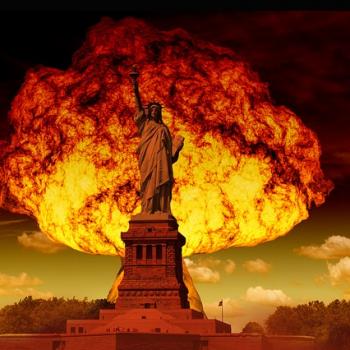Continuing the discussion on hell we started yesterday, I was asked to show the third option that exists beyond eternal conscious torment (the traditional hell), and annihilation. The third option that exists, of course, is universalism.
Yes, there are Christian Universalists– and they’re not a new thing. Christian Universalists existed among the early church, contributed to Christian thought well throughout the rest of history, and seem (by my unscientific observation) to be a growing number today.
I think this is an important position to discuss because of how quickly it is dismissed– often because of the word “universalism” and some of the connotations that has. When weighing this position, it’s important to note that Christian Universalism and Unitarian Universalism or simply a vanilla use of the term “universalism” are not the same thing. When we traditionally hear the word, we often associate it with the premise that “all flights lead to Rome”, or “all trails lead to the top of the mountain”.
Admittedly, I have a hard time with the type of universalism most think of when they hear the term. The idea that “all paths lead to the same God” is just completely illogical in my opinion, especially when you consider that the various paths themselves don’t even make that claim. Essentially, this type of universalism violates the principle that states two opposing truths cannot be true at the same time. Christian universalism however, is quite different which is why I prefer to refer to by the theological term, “universal redemption theory” so as to not confuse it with the other type of universalism.
The Christian form of this belief, instead of saying everyone is saved is better understood as the belief that everyone will be saved, eventually– not because all flights lead to Rome but because all will eventually turn to Christ. This view often maintains a belief in hell, but with the belief that hell is for the purpose of refining instead of eternal punishment– almost more of a Catholic purgatory than a Southern Baptist hell. Some do not maintain a concept of hell but rather see the “fire” as being metaphorical for God’s love which will purify everything.
For example, where as an annihilationist would argue that the purpose of the fire is to consume, universal redemption theory would argue that the purpose of fire is to refine. Though one would be separated from God, this view holds that God continues to invite repentance postmortem, and that eventually, all will willingly repent and come to Christ (“every knee shall bow” is seen not as a forced recognition of Christ, but of universal reconciliation with Christ). This question was perhaps most famously discussed in recent times in Rob Bell’s book, Love Wins, but even folks like CS Lewis held similar positions/asked similar questions, such as Lewis’ concept that hell is locked from the inside.
One of the hinges of this debate is on the Greek term aion, which is often translated into English as “eternal”. Some scholars have made compelling linguistic arguments that aion need not only/always be used in the same way as we use “eternal” in that it can also be properly translated as “age” or “age-long”– a period of time that has a completion. This alternative or deeper understanding of the word supports their belief that hell may not be a permanent state, and that people can still be redeemed postmortem.
Those who believe in a universal redemptive theory do have some scripture which they feel directly supports their view. As you look at some of these familiar passages (emphasis in each is mine) consider the passage from the position of universal redemption theory and you’ll see why they find many of these passages to be compelling support:
John 12:32: “And I, when I am lifted upfrom the earth, will draw all people to myself.”
Romans 5:18: “Consequently, just as one trespass resulted in condemnation for all people, so also one righteous act resulted in justification and life for all people.”
Col 1:19-20 “For God was pleased to have all his fullness dwell in him, 20 and through him to reconcile to himself all things, whether things on earth or things in heaven, by making peace through his blood, shed on the cross.”
There are some others used as proof texts, but the few examples I’ve given are just to demonstrate where this concept of universal redemption comes from– it is possible to see these verses and come to such a conclusion, which is why people who believe this are still orthodox Christians. Universal redemption theory still affirms all the key things that make one Christian– the only key difference is that the fires of hell (whether literal or metaphorical) are seen as having refining and redeeming qualities, instead of being designed simply as punishment (eternal conscious torment/ECT) or to consume (annihilation). What keeps this view within Christian orthodoxy is that it affirms that salvation is only through Christ and that there are in fact, consequences after death for the unjust. Again, the area of difference is a differing opinion on the purpose of it, and what that looks like– the purpose of the fire is redemptive in nature, leading to repentance and reconciliation with God through Christ.
Here’s my take on all of it:
While I don’t believe in universal redemption, I actively hope and pray that it is true.
If I am wrong, and every human being is ultimately redeemed by God and spends eternity in harmony with him, it will cause me to love him more not less.
The fact that I don’t believe it reflects my view of humanity, not God.
As my friend Ryan astutely put it, my reason for disbelieving is not because I believe God is unwilling or unable to save all, but because I don’t believe that every person will ultimately choose him. Even Rob Bell affirms this in Love Wins, so I essentially share his sentiments on this. I just don’t believe everyone will choose God– some, I believe, will resist him until they no longer exist. Scripture repeatedly talks about some who will experience a “second death”, and I simply cannot reconcile this with the idea that hell is 100% empty.
The concept of there being an opportunity for postmortem reconciliation makes sense with what we know about God’s character.
If we know that God is altogether good and wonderful, if we know that he is the complete expression of love… then it’s not a big jump to the concept that there will be an opportunity to be reconciled even after death. The difficulty with this, is that it cannot be explicitly proven using scripture– we’re certainly crossing over into the category of “opinion” (as is most of the discussion on afterlife in general, since scripture only lightly touches on this). However, I must also admit, that I know of nothing in scripture that explicitly prohibits it, either. What about people who never heard about Jesus? People who never had the opportunity to “see God for who he REALLY is?” What about the people who rejected Christianity because of horrible Christians (such as slaves owned by Christians, children of fundamentalists, etc.)? In these cases, the opportunity for postmortem reconciliation is the ONLY option that seems to account for God’s love and mercy. It’s certainly how I would do things… which begs the question: am I more merciful and loving than God? Surely, no. Which means, God is either RIDICULOUSLY generous with who gets in to begin with, or there is an opportunity to reconcile prior to the second death.
I really appreciate the take of my good friend, Kurt Willems, in a series he wrote on hell:
“If I were to give language for my view, until I come up with something better, I call this “purgatorial conditionalism.” This reflects that Judgment Day will be a time for all to enter the metaphorical fires of God’s love, that will burn up the bad and refine what is good. For those who have not received the gift of immortality, there might be an opportunity to endure God’s loving wrath unto reconciliation with Christ. For those who yet refuse, they will experience the second death. This is because immortality is conditional upon reconciliation with God through Christ. An eternal hell is a Greek construct but the possibility of not receiving salvation remains.”
Reality: something that might shock both fundamentalists and progressives alike.
I’ve done a lot of processing in the last day, so here’s where I (currently) land:
I think everyone might end up shocked. I think Evangelicals will be shocked that things don’t turn out as neat and clean as they thought, and that there will be a lot of people in heaven who they didn’t think would get there. Conversely, I think progressives will be shocked that there actually was some criteria we needed to heed to avoid judgement for our sin. If there is no coming judgement, then half of the New Testament doesn’t make sense– and the imperatives don’t make sense either: change the way you live (repent), believe (faith), make disciples, care for widows and orphans, etc. If there’s no judgement, no potentially negative consequences for rejecting God, then the teachings of Christ and the early church really become quite irrelevant.
Neither side has a compelling narrative that strikes me as altogether true. The conservatives close the door to God’s creative grace and mercy while the liberal side seems to overlook the seriousness of sin and the sense of urgency we see in scripture to believe and be reconciled with God through Christ.
How will things play out? I think the most likely scenario is a middle ground between annihilation and universal redemption as my friend Kurt described above. I think the opportunity for postmortem reconciliation is a likely, but not guaranteed scenario, but those who continually resist reconciliation with God through Christ will most likely cease to exist at some point (the “second death” that seems clear in scripture) as a result of their own choices.
So, here’s a summary of Universal Redemption (Christian Universalism): all are either saved by Christ or will be saved by Christ. The fire described in scripture is either descriptive of a finite time at the end of which people will choose reconciliation with God through Christ, or the fires are metaphoric of God’s love which will refine and lead one to finally see God as he truly is– thereby prompting the choice of reconciliation with God.
It is an interesting concept, and many parts make sense to me, but my concern is that there are clear imperatives in the New Testament that cannot be ignored without writing off a ton of scripture– including the words of Jesus himself– and I think this would be a critical error. So, universal redemption/postmortem reconciliation? Maybe. But in the meantime, we must not ignore that scripture prompts us to be reconciled with God in the here and now, and that one shouldn’t wait for the risky notion that there might be a second chance.
















